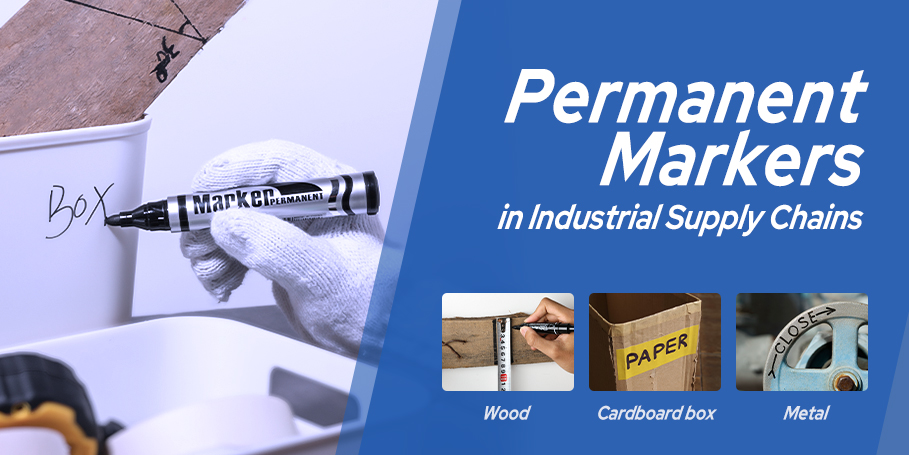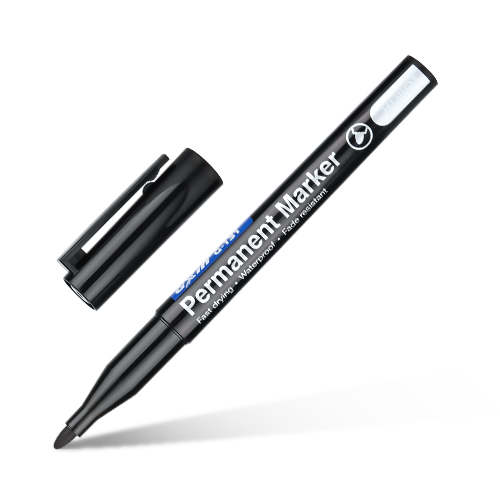
Permanent Markers in Industrial Supply Chains
When people think of permanent markers, the first association is often classrooms, offices, or everyday labeling tasks. However, permanent markers have a much broader and deeper role in industrial environments. From steel factories to logistics warehouses, from construction sites to shipping docks, permanent markers are relied upon for their ability to write clearly and durably on a wide variety of surfaces. For B2B buyers, particularly those in industrial supply chains, permanent markers are not just tools of convenience—they are essential for safety, efficiency, and long-term operational reliability.
Industrial Supply Chains and the Need for Durable Tools
The industrial supply chain is defined by complexity and precision. Every stage—raw material handling, storage, manufacturing, packaging, and transportation—requires tools that can withstand demanding conditions. Labels and markings play a critical role in ensuring that goods are identified, tracked, and processed correctly.
Permanent markers, with their ability to create bold, lasting marks on surfaces like metal, plastic, rubber, wood, and glass, fill an indispensable role here. Unlike adhesive labels that may peel off, or chalk that can be wiped away accidentally, permanent markers provide certainty. They are especially useful in environments with heat, dust, moisture, or heavy handling where weaker markings would quickly disappear.
According to Grand View Research, the global marker pen market size was valued at USD 1.95 billion in 2020 and is expected to grow at a CAGR of 3.9% from 2021 to 2028, with permanent markers being a dominant category due to their industrial applications【Grand View Research, Marker Pen Market Report 2021】. This growth reflects not only consumer use but also the expanding needs of supply chain management worldwide.
Key Applications in Industry
Steel and Metal Processing
In foundries, factories, and construction sites, workers use permanent markers to indicate measurements, mark cuts, or identify components. Ink that adheres to oily or hot surfaces is crucial.
Warehousing and Logistics
Supply chains depend on efficient labeling. Permanent markers allow staff to mark cartons, pallets, and packages even when barcodes are absent or labels fail. The quick-drying ink ensures no smudging, which is essential for keeping goods moving.
Construction and Carpentry
Builders use permanent markers to identify materials, mark beams, or note instructions. Unlike pencils, which fade or smudge, markers stay visible throughout the project.
Shipping and Transport
Containers and packaging traveling across oceans face humidity, salt air, and rough handling. Permanent markers provide a simple but effective method of keeping shipment information intact.
Safety and Compliance
In chemical industries, clear labeling is critical for compliance with safety regulations. Permanent markers that resist water and chemical smearing ensure that warnings and instructions remain legible.
Quality Demands of Industrial Buyers
For large-scale procurement, industrial buyers look beyond low-cost options. Instead, their priorities include:
Ink Longevity: Markers that resist fading even under sunlight or moisture.
Surface Versatility: The ability to mark on non-porous, rough, or slick surfaces.
Durability of Nibs: Marker tips that can withstand tough materials without fraying.
Certifications: Safety compliance such as ASTM D-4236, or regional requirements for industrial supply.
Bulk Reliability: Consistency across thousands of units in one shipment.
Buyers are also aware of counterfeit or poor-quality products in the market. Substandard markers that dry out quickly or smear under pressure can disrupt entire supply chains. This is why reputable manufacturers with automated production lines and strict quality controls are highly valued in B2B sourcing.
OEM and ODM Opportunities
Permanent markers are not just generic products; they are branding opportunities. Distributors in the industrial supply sector often prefer OEM and ODM customization to align with their corporate identity.
For example, a logistics company may request bulk orders of black permanent markers featuring their logo, distributed across warehouses globally. Similarly, construction supply brands can differentiate themselves by offering high-performance permanent markers designed specifically for builders, with reinforced tips and heavy-duty ink.
Customization also extends to packaging. Industrial buyers may request markers packed in bulk cartons rather than consumer-oriented blister packs, reducing costs and streamlining distribution.
Environmental Considerations
A growing trend in industrial supplies is the focus on sustainability. While permanent markers are traditionally solvent-based, many manufacturers are innovating with low-VOC (volatile organic compound) inks and recyclable casings. This reflects broader environmental, social, and governance (ESG) goals adopted by multinational corporations.
According to a 2022 McKinsey & Company survey, over 70% of supply chain executives cited sustainability as a top priority in procurement decisions【McKinsey & Company, Supply Chain Sustainability Report 2022】. For permanent marker suppliers, aligning with this trend means not only developing eco-friendly products but also offering transparency in material sourcing and compliance certifications.
Supply Chain Reliability and Global Procurement
The global nature of industrial supply chains means that reliability in delivery is as important as product quality. Delayed shipments or inconsistent quality can disrupt entire operations. Large buyers therefore prioritize manufacturers with proven logistics expertise, international certifications, and automated processes to ensure consistency.
China, as one of the world’s largest producers of writing instruments, remains a key sourcing hub for permanent markers. Manufacturers such as GXIN, with over 20 years of experience, automated assembly lines, and exports to more than 50 countries, exemplify the kind of partners industrial buyers seek for long-term cooperation.
Conclusion: Permanent Markers as Silent Heroes
While they may not receive much attention, permanent markers are silent heroes in industrial supply chains. They ensure goods are correctly identified, projects stay organized, and compliance is maintained. For B2B buyers, choosing the right manufacturer is not a minor detail—it is a strategic decision that impacts reliability, efficiency, and brand reputation.
As industries grow more complex and globalized, the demand for durable, versatile, and eco-friendly permanent markers will only increase. Suppliers who can combine technical innovation, sustainability, and reliable logistics will not only thrive but will also become integral partners in the global supply chain ecosystem.





